
Natalie Perez: Can you give a snapshot of your background and how you got into making music?
Angel White: So I didn't start making music until the end of my senior year of high school, but I always loved music. My dad showed me music growing up starting around age six. At least, that's when I could really recognize what I was listening to, which was usually Erykah Badu, Mama's Gun. That was the first album I recognized. “Green Eyes.” I love that song. So it was everything from Erykah to John Denver — the full spectrum of music growing up.
At the end of my senior year, I was around friends who were rapping, actually. So I was also kind of rapping at that time, just having fun. I went to college to play football in Oklahoma and was still making music, so I was traveling back to Texas often just to do sessions and whatnot. I only went to that school and played football for a year because…this was not it for me. I was also going to be a veterinarian…all of it together was just a lot.
Not that I didn't care for football. I love football. It just wasn't fun for me anymore. So in 2015 I dropped out, went back to Cleburne where I grew up, moved in with some friends, and started a band. And that was when I made the decision, "Okay, music’s what I'm about to do."
AW: Yeah, definitely. I think aesthetically I've showcased “the cowboy” more so far, but I grew up in the country. Growing up, it was always open space, fishing for catfish, running around with your brothers and cousins and whatnot. But musically, the inspiration’s always been open spaces and big fields. When I'm playing the guitar, or when I’m listening to music, it's always at sunset, or in a big field, or along the hills — where I’m from we don’t have mountains, we have hills. That's pretty much what I took away the most from my upbringing and what inspires me in a visual sense, which then is transposed into songs.
NP: It definitely comes across in your music. I can feel it. I grew up in rural Texas as well and your songs remind me of home.
To you, what does it mean to be a cowboy?
AW: A cowboy is a working, respectable, honorable person — but also, a little reckless. At least, I am sometimes. All the cowboys — or cowgirls — I know are very strong, respectable people. Like my grandma, she's a cowgirl. She's the shit. She's so strong…and her word! She always keeps her word. It's not necessarily what you're doing at the moment or where you are.
Some people just kind of channel the aesthetic of a cowboy and think that’s what it means to be one. But when it comes down to it, being one is different than just dressing like one.
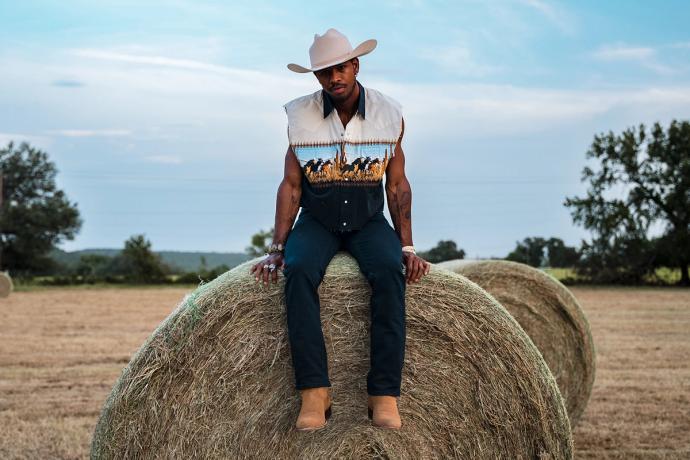
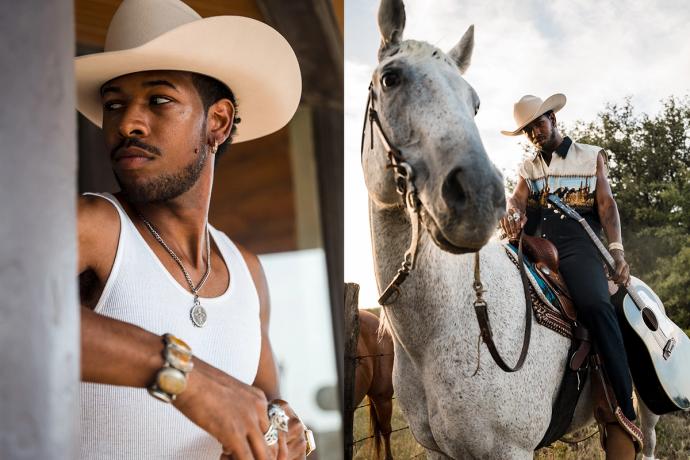
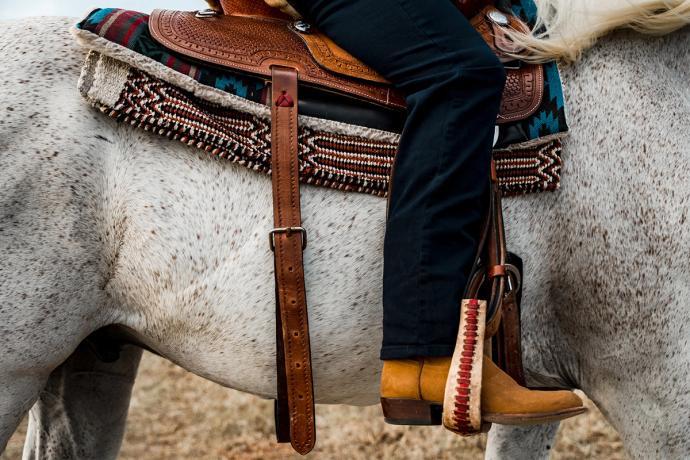
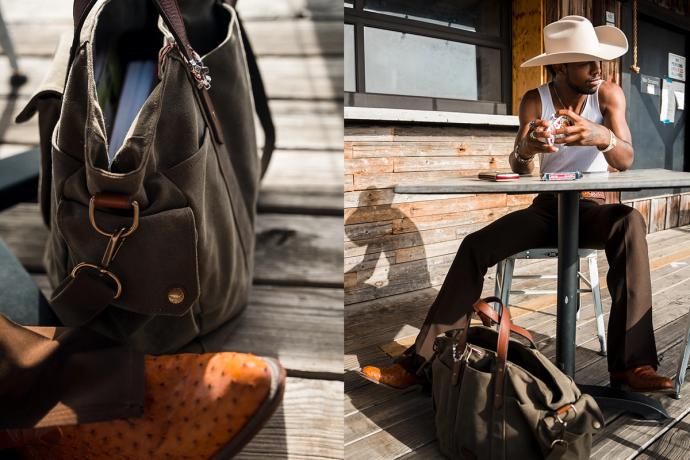
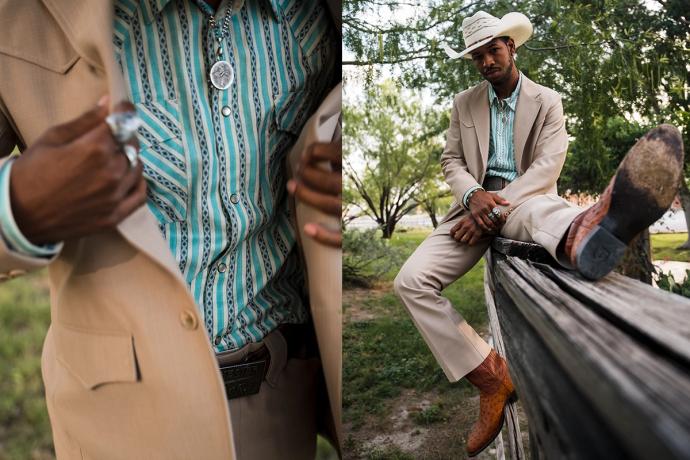
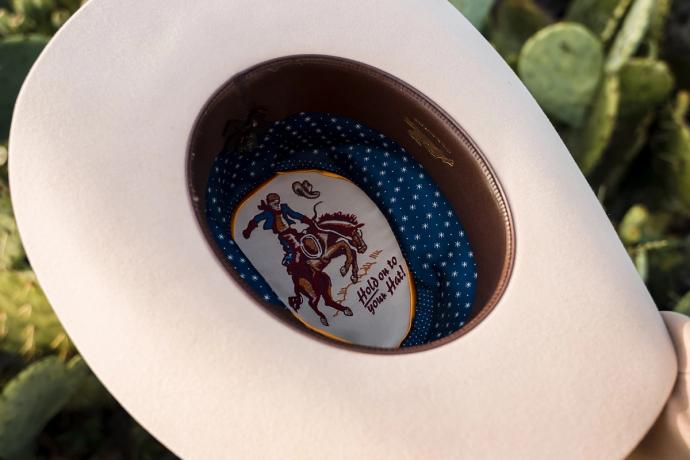
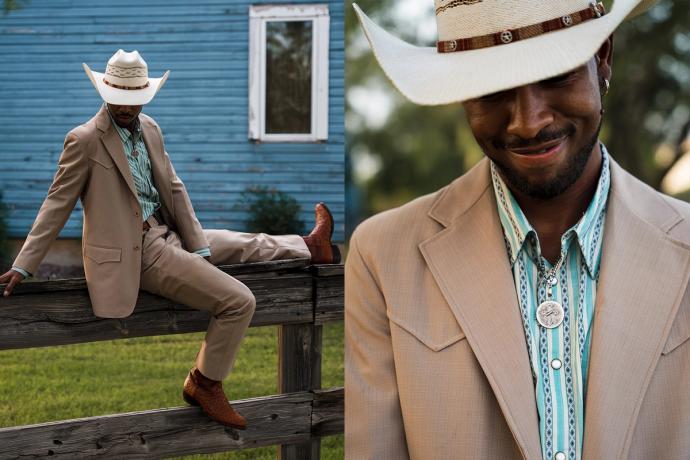
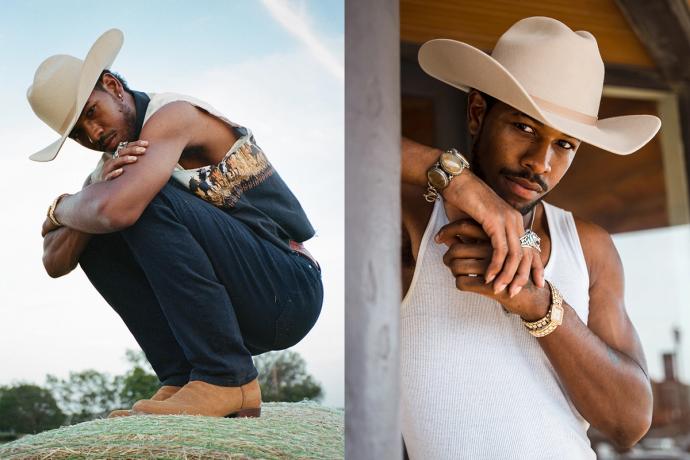
NP: Although rooted in country, you’ve got quite a genre-bending sound. How would you classify your music, or do you even want to classify your music?
AW: I probably wouldn't. I could…but I wouldn't. It's just a Southern, free spirit sound. Again, going back to the way I started making music, I draw from this entire spectrum of sound, not just specifically one type of thing. Granted, this new record happened because I was feeling very pulled to a certain super warm sound. I mean, I've played guitar for six years now, so guitar’s always been part of the process, but I was leaning into a very country sound with the guitar and my friend was like, lean into it as much as you can. Just lean into it. And that's when this whole new door opened for me for what I could do. So I just decided, “alright, that’s it, I'm going to walk through that door," and all of this followed. It's pretty cool.

NP: Do you have any musical influences, maybe in the Texas music scene or just in general, that have helped you develop this distinct sound of the moment?
AW: At the time I was making the album, I listened to a lot of Chris Stapleton, like, a lot. Not that he's Texas country, but that’s just who I've been listening to. So a lot of Chris, a lot of Jeff Buckley, Charley Crockett…Ray LaMontagne, he’s one of my top five. Frank Ocean is spectacular. He's one of the best artists in the world and a big influence for me. Who else was I listening to at that time…oh, Sierra Ferrell. She's super tight, and very folky.
I was just in such a country space at the time and that’s all I was listening to. But I wasn't, at least consciously, pulling inspiration from them. I was just listening to what they were doing and surrounding myself with all of those elements of country. And then on top of going out pretty much to “the sticks” to record the album, it was influenced by a lot of slide guitar. It was slide guitar and my voice that really pushed the record. Once we made the first song, “Running in Place,” I decided, "well, this is what it's going to sound like." It was really easy after that. Once we started, it was a song a day.
I think I'm in a really good spot of originality. I have always strived to be original, but this space feels very, very new. Specifically for country music, too. It’s not conventional. We talked about the fact that my voice is not a country voice a lot in the studio. It’s just not. But my vocals are over country guitar and country drum and the juxtaposition is beautiful.

NP: Tell us about your new album, GHOST OF THE WEST. What does this project mean to you and what do you hope listeners take away from it?
AW: So the GHOST OF THE WEST…it's funny how it even came to be. The “GHOST OF THE WEST” in a sense, was about the topic of my dad not being there. But then I was also this “GHOST OF THE WEST”... because the Spanish cowboy and the Black cowboy are a little washed from the public eye. I mean, there are plenty of places that’ll give you information on the history. But I’m talking about the fact that people are just so surprised when they see me. There's two sides to it. There's the, "Oh, wow! That's kind of an admirable, beautiful thing." And then there’s the, "Oh I've never seen that before, ever." Yeah, that's the “GHOST OF THE WEST.”
And then, it’s about all of those before me, even within my family, raising horses for the last 100 years — it's for all of them as well. Even singing at the rodeo the other day…I really felt that fully, being a representation of so many people, so many more than just myself, so much bigger than just me. So the “GHOST OF THE WEST” is this lineage aspect, a piece of abandonment and a lot of lost love, but also about love gained and new perspective. So it’s broken into chapters, essentially, about lost love, grief, and new identity. And then the conclusion of the record is about finding peace.
I think people will take away whatever they feel. It’s the most extensive writing I've ever done and deepest writing I've ever done. So I think people will pull a lot of different things from it, for themselves. It’s all up for different interpretation. I have my meanings for it and my reasons, but it's just a matter of what people want to take from it, too.

NP: You recently got to sing the national anthem at the annual Juneteenth Black Rodeo, an event that celebrates the history of the Black cowboy. You mentioned earlier that you felt you were representing much more than just yourself by being involved with this event. What was that experience like?
AW: Well, it went beautifully. The main thing is, I knew I was representing more than myself. The energy in the room, even though it was concentrated on me, was unifying. On a personal level, it was the 33rd annual one, and I have a connection with the number three. So that was just this little wink from the universe that you get a giggle out of.
And then on a family basis, to be able to represent myself and my people, but also a whole lot of other people. You could just feel it…I was pretty out of body as it was happening. Even waiting behind the gate to walk into the middle of the arena, I felt like a horse myself, just waiting. I was like, "Wow, this is crazy. This is what they feel like." But yeah, there were so many layers to it, but it was an honorable experience.
NP: I’d be remiss if we didn’t talk about your style – it’s so refined and unique. Do you lean on fashion to help tell your story? Especially living in such an urban environment like Dallas.
AW: Yeah, I would say so. At least, right now a lot as far as displaying and showcasing the lifestyle. I mean, whether that be a photo of me in really cool clothes or me on a horse or me with some bees, that's just the lifestyle.

NP: Is there a signature Angel White ‘fit? A uniform of sorts?
AW: I always got on a hat for the most part... a cowboy hat. But not too many signatures because I got too many clothes!
You know, I always got on boots. If I’m wearing shorts, I got on boots, that's just how it goes. It's easy to throw them on and get going anywhere. I can go on a hike or I can go dance…don't matter, I got my boots on. So I guess if I did have a signature, it'd be the boots.

Photos by Natalie Rhea - @natalie_rhea
Interview by Natalie Perez - @natperezphoto
Featuring Angel White - @angl.whte
Produced by Modern Huntsman - @modernhuntsman
Credits
Interview by
Natalie Perez
Photos by
Natalie Rhea